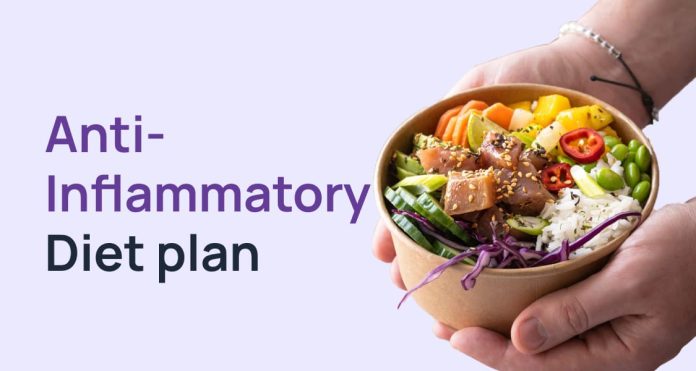
In recent years, there has been growing awareness about the impact of diet on inflammation in the body. Chronic inflammation is associated with various health issues, including heart disease, diabetes, arthritis, and even certain cancers. An anti-inflammatory diet plan aims to reduce inflammation, promote overall health, and improve well-being. This article explores the principles of an anti-inflammatory diet, the foods to include and avoid, and practical tips for creating a sustainable dietary plan.
Understanding Inflammation
Inflammation is a natural response of the body’s immune system to injury or infection. It serves a protective purpose, helping the body heal. However, when inflammation becomes chronic, it can lead to various health problems. Factors such as poor diet, sedentary lifestyle, stress, and environmental toxins can contribute to chronic inflammation.
Chronic inflammation is linked to several diseases, including:
- Heart Disease: Inflammation plays a critical role in the development of atherosclerosis, which can lead to heart attacks and strokes.
- Diabetes: Chronic inflammation is associated with insulin resistance, which can contribute to the development of type 2 diabetes.
- Arthritis: Conditions like rheumatoid arthritis are characterized by inflammation in the joints, leading to pain and stiffness.
- Cancer: Chronic inflammation may promote cancer development by causing DNA damage and promoting tumor growth.
The Principles of an Anti-Inflammatory Diet Plan
An anti-inflammatory diet emphasizes whole, nutrient-dense foods while minimizing processed foods, sugar, and unhealthy fats. Here are the key principles:
- Focus on Whole Foods: Prioritize fresh fruits, vegetables, whole grains, lean proteins, and healthy fats. These foods are rich in antioxidants, vitamins, and minerals that help combat inflammation.
- Emphasize Fruits and Vegetables: Aim for a colorful variety of fruits and vegetables, which are packed with antioxidants and phytochemicals that reduce inflammation. Dark leafy greens, berries, and cruciferous vegetables like broccoli and cauliflower are particularly beneficial.
- Choose Healthy Fats: Incorporate sources of omega-3 fatty acids, such as fatty fish (salmon, mackerel), walnuts, chia seeds, and flaxseeds. These fats have anti-inflammatory properties and can help improve heart health.
- Limit Refined Carbohydrates and Sugars: Reduce intake of white bread, pastries, sugary drinks, and processed snacks. These foods can spike blood sugar levels and promote inflammation.
- Reduce Red and Processed Meats: Limit consumption of red meat and processed meats, which are associated with higher levels of inflammation. Opt for lean protein sources, such as chicken, turkey, fish, legumes, and plant-based proteins.
- Include Whole Grains: Choose whole grains like brown rice, quinoa, oats, and barley, which are high in fiber and have anti-inflammatory properties.
- Stay Hydrated: Drink plenty of water and consider incorporating herbal teas, which may also have anti-inflammatory effects.
- Limit Alcohol and Caffeine: Excessive alcohol and caffeine consumption can contribute to inflammation. Moderation is key.
Foods to Include in an Anti-Inflammatory Diet
Here’s a list of foods that can help reduce inflammation:
- Fruits: Berries (blueberries, strawberries), cherries, oranges, and apples.
- Vegetables: Leafy greens (spinach, kale), broccoli, Brussels sprouts, and sweet potatoes.
- Whole Grains: Oats, brown rice, quinoa, and whole grain bread.
- Healthy Fats: Olive oil, avocados, nuts (walnuts, almonds), and seeds (chia, flaxseeds).
- Lean Proteins: Fatty fish (salmon, sardines), chicken, turkey, legumes, and tofu.
- Herbs and Spices: Turmeric, ginger, garlic, cinnamon, and green tea.
Foods to Avoid
To maximize the benefits of an anti-inflammatory diet, certain foods should be limited or avoided:
- Refined Sugars: Candies, sodas, baked goods, and other sugary snacks.
- Refined Carbohydrates: White bread, pasta, and pastries.
- Trans Fats: Found in many processed foods, fried foods, and margarine.
- Excessive Alcohol: High alcohol consumption can increase inflammation.
- Processed and Red Meats: Sausages, bacon, and other processed meats should be minimized.
Practical Tips for Following an Anti-Inflammatory Diet
- Meal Planning: Plan your meals ahead of time to incorporate anti-inflammatory foods. Create a shopping list to avoid impulse purchases of unhealthy options.
- Cook at Home: Preparing meals at home allows you to control ingredients and portion sizes, making it easier to adhere to an anti-inflammatory diet.
- Experiment with Recipes: Try new recipes that feature anti-inflammatory ingredients. For example, incorporate turmeric in soups, salads, and smoothies for added health benefits.
- Mindful Eating: Pay attention to your body’s hunger and fullness cues. Eating mindfully can help prevent overeating and promote better digestion.
- Stay Active: Regular physical activity can complement the benefits of an anti-inflammatory diet. Aim for at least 150 minutes of moderate exercise each week.
An anti-inflammatory diet plan is a holistic approach to promoting health and reducing inflammation through nutrition. By focusing on whole, nutrient-dense foods and minimizing processed options, individuals can potentially lower their risk of chronic diseases and improve their overall well-being.
While the anti-inflammatory diet is generally beneficial, it’s essential to consult with a healthcare professional or registered dietitian before making significant dietary changes, especially for individuals with existing health conditions. By adopting an anti-inflammatory diet, you can take proactive steps towards a healthier lifestyle and enhance your quality of life.














